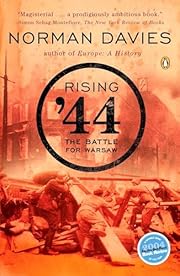Cargando...
▾Conversaciones (Enlaces relacionados)
▾Relaciones con series y obras
▾Descripciones del libro
Rising '44 is a brilliant narrative account of one of the most dramatic episodes in 20th century history, drawing on Davies' unique understanding of the issues and characters involved. In August 1944 Warsaw offered the Wehrmacht the last line of defence against the Red Army's march from Moscow to Berlin. When the Red Army reached the river Vistula, the people of Warsaw believed that liberation had come. The Resistance took to the streets in celebration, but the Soviets remained where they were, allowing the Wehrmacht time to regroup and Hitler to order that the city of Warsaw be razed to the ground. For 63 days the Resistance fought on in the cellars and the sewers. Defenceless citizens were slaughtered in their tens of thousands. One by one the City's monuments were reduced to rubble, watched by Soviet troops on the other bank of the river. The Allies expressed regret but decided that there was nothing to be done, Poland would not be allowed to be governed by Poles. The sacrifice was in vain and the Soviet tanks rolled in to the flattened city. It is a hugely dramatic story, vividly and authoritatively told by one of our greatest historians.
▾Descripciones de biblioteca
No se han encontrado descripciones de biblioteca.



 Google Books — Cargando...
Google Books — Cargando... (3.8)
(3.8)
El relato es trágico y peor aun considerando que los aliados fueron a la guerra por Polonia, el primer aliado, para salvarla de una tiranía totalitaria y colectivista que pretendía dejar una sola raza para dejarla caer en otra que pretendía dejar una sola clase.
Es llamativo indicar como prácticamente todos quienes cayeron en manos de la Gestapo y de la NKVD señalaban que la tortura alemana era un juego de niños al lado de los rusos. Quizás la historia polaca de la II guerra mundial no sea tan popular porque justamente deja en evidencia las contradicciones de las potencias occidentales al aliarse con la URSS, quien ya había invadido Polonia en 1939 JUNTO a los alemanes y celebrado un desfile de la victoria en Varsovia. Davies entrega buenos argumentos para colocar al alzamiento de Varsovia del 44 como el primer conflicto de la Guerra Fría. (